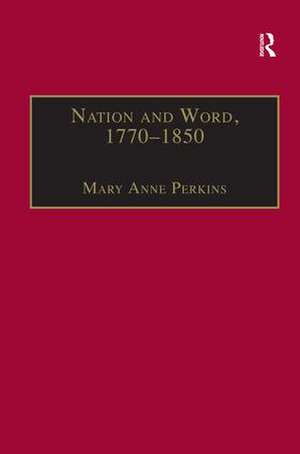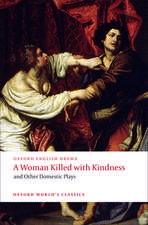Nation and Word, 1770–1850: Religious and Metaphysical Language in European National Consciousness
Autor Mary Anne Perkinsen Limba Engleză Hardback – 18 aug 1999
Preț: 496.94 lei
Preț vechi: 665.62 lei
-25% Nou
Puncte Express: 745
Preț estimativ în valută:
95.09€ • 99.28$ • 78.70£
95.09€ • 99.28$ • 78.70£
Carte tipărită la comandă
Livrare economică 04-18 aprilie
Preluare comenzi: 021 569.72.76
Specificații
ISBN-13: 9781859282861
ISBN-10: 1859282865
Pagini: 392
Dimensiuni: 156 x 234 mm
Greutate: 0.45 kg
Ediția:1
Editura: Taylor & Francis
Colecția Routledge
Locul publicării:Oxford, United Kingdom
ISBN-10: 1859282865
Pagini: 392
Dimensiuni: 156 x 234 mm
Greutate: 0.45 kg
Ediția:1
Editura: Taylor & Francis
Colecția Routledge
Locul publicării:Oxford, United Kingdom
Cuprins
Contents: Introduction; Part One: Linguistic and National Identity: Language and nationhood; the issues; Reformation: Luther and the bond of nation and word; National language: the search for origins; Language and national character; Nationhood and language: contiguous concepts; Nation and logos: the influence of the fourth gospel; Part Two: Nation as Word: a Creative, Revelatory and Redemptive Role: Symbols and nations; Prophets, priests and poets: visionary language and the national ideal; Revelation and mission; Chosen nations; The nation as Messiah; Part Three: Narratives of Nationhood: Law, Monarch, Church and People: Nation and Incarnation: an introduction; Nation and the word of law; Nationhood and sovereignty; Rational and moral community; Nation, church and state; The new religion of nationalism; National identity and ’otherness’; Conclusion; Appendices; Bibliography; Index of names.
Recenzii
'... brings together a diverse group of Romantic-era ideas in which language, philosophy, and theology are interwoven in complex ways.' Romanticism on the Net '... should be read precisely because it provides a powerful counter to what has been, at least until very recently, the critical orthodoxy of a materialist Romantic history...' Romanticism on the Net '... wide-ranging and readable study...' Journal of Ecclesiastical History 'It is recommended reading for historians of religion, nationalism, and European intellectual history.' Church History
Descriere
The emergence of the modern nation state in Europe and the accompanying rise in national consciousness led to a heightened awareness of the close relationship between language and national identity. In this book the author shows that this relationship was expressed through the themes and figures of a ’language’ of nationhood, drawn from a common European cultural heritage, particularly the Classical and Christian traditions. Despite its common roots, this language became the medium through which the diversity of national characters was expressed. The idea of the divine Word, for example, enabled the sacredness and power of national language to be celebrated. The identification of poet and prophet gave Romantic nationalists an authority to speak for and to the nation, and the theme of the Chosen People was often adopted to express the elect status of a writer’s own nation. In conclusion, it is shown that this language of nationhood remains a powerful force at the end of the twentieth century.
















